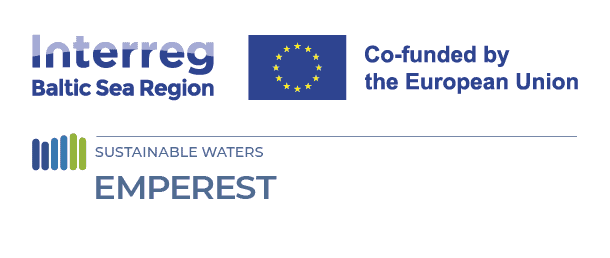
Webinar for navigating the future of wastewater treatment
09 April 2025
Shedding the light on the challenge of micropollutants and related regulatory shifts, UBC Sustainable Cities Commission launched the UBC TALKS webinar on 25 March 2025, emphasizing technological advancements and capacity building for local authorities and water operators. Over 70 participants actively exchanged in this webinar.
Tackling organic micropollutants amidst new EU regulations
The context of this challenge was introduced at the webinar by Mikhail Durkin, Executive Secretary at the Coalition Clean Baltic, presenting the impact of micropollutants on aquatic environment and the European regulatory advances.
“I was in a similar setting almost 20 years ago with other Interreg projects just starting and addressing at that time not hazardous substances but nutrients. I am very happy to see that now there is a new shift and a new generation of experts coming to work on hazardous substances from wastewater treatment.”
— Mikhail Durkin, Coalition Clean Baltic.
Recognizing the raising threat of organic micropollutants, the European Union has taken decisive steps to enhance wastewater treatment standards. The revised Urban Wastewater Treatment Directive introduces more stringent measures to safeguard the environment and public health:
- Implementation of the quaternary treatment: By 2045, all wastewater treatment plants over 150 000 PE (population equivalent) must adopt quaternary treatment to remove a broad spectrum of micropollutants. Plants serving agglomerations of above 10 000 PE, especially those located in sensitive areas, will implement this based on risk assessments.
- Extended producer responsibility: The Directive requires the producers of pharmaceuticals and cosmetics to cover at least 80% of the costs associated with quaternary treatment, upholding the “polluter pays” principle.
Advanced technologies to address organic micropollutants and even PFAS
The implementation of these ambitious goals is where the EMPEREST project comes in. Led by UBC Sustainable Cities Commission, this project has been launched exactly in time to support the implementation of the recast Urban Wastewater Treatment Directive. Lotta Lehti, coordinating EMPEREST, introduced how the project has developed and is currently piloting a smart mobile solution to plan large-scale investments into advanced wastewater treatment.
This solution comes in a shape of two sets of containers: one built in Tartu, another in Gdansk, following on their journeys to test advanced wastewater treatment at least in 3 different cities each. This not only will give us a comprehensive understanding of the micropollutants situation in the region, but also support these wastewater treatment plants in choosing more efficient trains of technologies for the coming full-scale investments.
Taavo Tenno, Associate Professor from the University of Tartu, presented this work as the project leader of these activities and the creator of the pilot plant concept for Tartu. Together with Marlen Taggu, technologist at Tallinn Water Ltd., they introduced the piloting highlights from Tartu and Tallinn.
“Before this project started we had already done PFAS analysis before, so we had a pretty good idea of which substances were an issue for us. But for pharmaceuticals this project was very helpful, because we didn’t have that much data. So we took a broad approach covering the wide range of compounds and now we know what to focus on in the future.”
— Marlen Taggu, Tallinn Water Ltd.
Experiences from Poland followed, where the pilot container was constructed by Gdansk Water Utilities Ltd., and its Chief Process Engineer Marek Swinarski introduced the technologies, with Piotr Miakoto, Manager of the Pomorzany WWTP at the Water and Sewage Company Ltd. of Szczecin, sharing their piloting experiences.
“We have developed a tool that can be used by numerous wastewater treatment plants and their operators to evaluate the efficiency of micropollutant removal by means of advanced treatment processes.”
— Marek Swinarski, Gdansk Water Utilities Ltd.
Latest EMPEREST findings can be discovered in the webinar recording, or explored on the designated project pages: Tartu-Tallinn-Turku pilot / Gdansk-Szczecin-Kaunas-Riga pilot.
Capacity building and looking ahead
No advanced treatment technologies can be effectively applied without robust capacity building. In EMPEREST, the still-existing knowledge gap about PFAS and other micropollutants is answered by the online training package to build capacities of water utilities and local authorities. The structure and topics of the package – the first chapters of which can already be accessed in the Baltic Smart Water Hub, – were introduced by Vanessa Ingold from DWA German Association for Water, Wastewater and Waste.
EMPEREST offers many more meeting arenas for experts interested in removing organic micropollutants from wastewater and addressing the challenge of PFAS, some of which were highlighted at the end of the webinar by EMPEREST communication manager Mariia Andreeva:
- Within EMPEREST project, HELCOM has published in March 2025 the “Methodological recommendations for the monitoring and assessment of PFAS in the aquatic environment”.
- The in-person opportunity to discuss innovative technologies to remove micropollutants is coming on 13 May 2025 in Szczecin, Poland. Agenda is published and the registration is open!
The presence of organic micropollutants in our waterways is a pressing issue that demands immediate attention. As European cities embark on this transformative journey to the toxic-free future, integrating advanced technologies, adhering to regulatory frameworks, and continuously investing in human capital will be crucial to ensure a sustainable and healthy aquatic environment for future generations.





